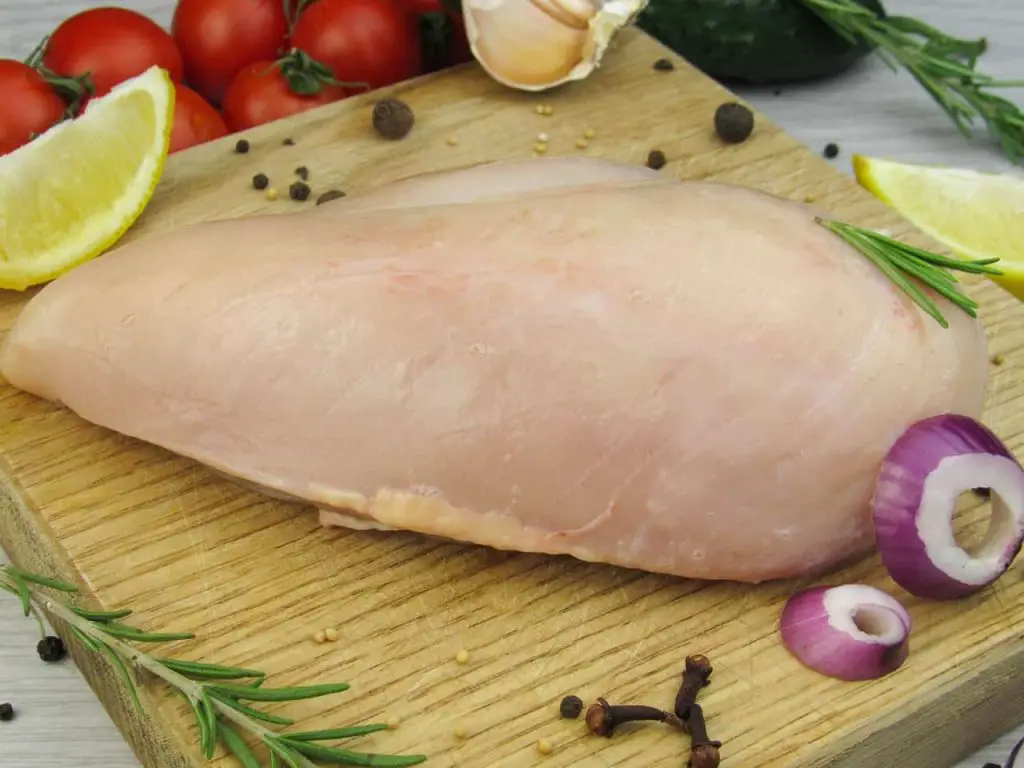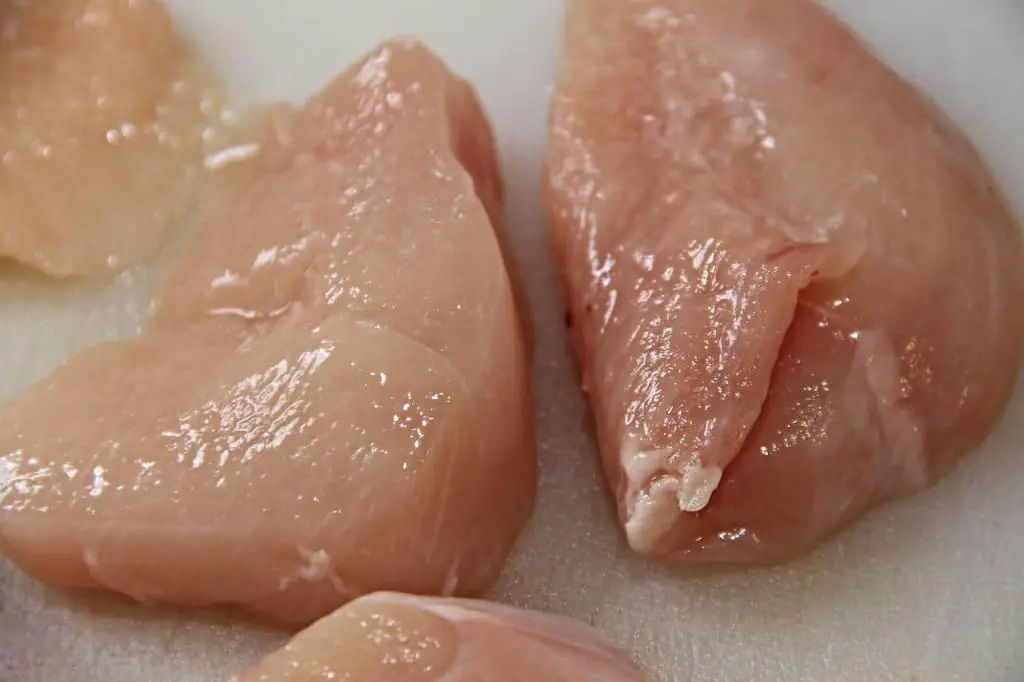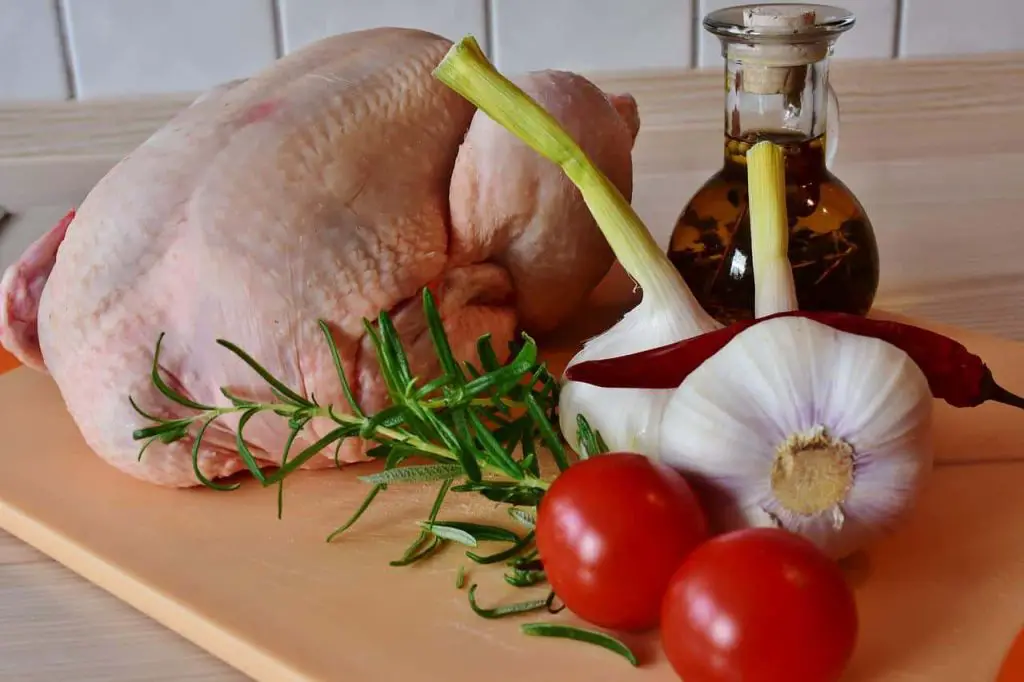Chicken is a common protein found in commercial dog food and dog treats. One reason dog owners see more chicken products is because it is usually less expensive than other proteins and readily available in most grocery stores. Dogs can eat cooked chicken, but can dogs eat raw chicken?
It is a hot topic among dog owners, can dogs eat raw chicken? The answer is complicated and requires more than a yes or no reply. A dog’s short digestive tract is designed with the capabilities to digest raw proteins, like chicken. However, 99% of the raw chicken sold in markets today is not suitable to feed your dog.
In this article, Can Dogs Eat Raw Chicken, you will learn about the nutritional benefits found in chicken, the problem with commercial chicken and the harmful bacteria found in chicken.
- Nutritional Value of Chicken for Canines
- Potential Dangers of Feeding Raw Chicken to Dogs
- Fatty Acid Imbalance Found in Commercial Chicken
- Alternatives to Commercially Grown Raw Chicken
Raw chicken is not toxic to dogs and will not poison them. It is uncommon for a dog that accidently ate raw chicken to see ill effects. However, dog owners should know both the benefits of feeding raw chicken and the bigger issue of long-term illness from feeding raw commercially raised chicken.
Related Articles:
- A Review of the Top 5 Best Brooms For Dog Hair
- A Review of the 5 Best Peanut Butters for Dogs
- A Review of the 4 Best Dog Shampoos for Itchy Skin
- A Review of the 5 Best Dog Brushes For Short Hair
- A Review of the 6 Best Dog Harnesses for Hiking
Can Dogs Eat Raw Chicken? Nutritional Value of Chicken for Canines
Can dogs eat raw chicken? The answer would be a yes but only chickens raised in natural environments. Chickens raised on quality organic grains and with exposure to sufficient sunshine produce healthier meat for the consumer. Keep in mind that what a chicken eats, directly affects the nutrition in the meat that humans and dogs consume.
Can Dogs Eat Raw Chicken? Health Benefits of Eating Quality Chicken
- Great source of protein (38 grams of protein in 1 cup of cooked chicken)
- No carbohydrates, low fat, and naturally free of sugars.
- Potassium: necessary electrolyte that aids in proper function of the heart, nerves, and muscles. It helps muscles contract and relax. Supports healthy kidney and heart function.
- Phosphorus: needed for healthy bones, teeth, and metabolism
- Magnesium: supports energy production and aids in ligament and bone maintenance
- B12: aids in healthy digestion and crucial for nervous system and brain health.
Chicken feet, from farm-raised chickens, contribute to healthy joints in a canine. The feet are high in glucosamine and chondroitin. They can be eaten raw (with nails removed), roasted, or made into a nutritious broth.
Organs such as chicken liver, heart and giblets are a nutritious part of a dog’s diet. They contain essential amino acids, are easy for a dog to digest, and they support a healthy skin and coat. Organs, like liver, are considered the multi-vitamin in dog nutrition.
The biggest factor that makes raw chicken healthy or unhealthy is the environment in which the chicken was raised as well as the ingredients found in the chicken feed. It is these two components that raise red flags in feeding canines commercial chicken.

Related Articles:
Can Dogs Eat Raw Chicken? Potential Dangers of Feeding Raw Chicken to Dogs
When you want to be on the safe side, the answer to, can dogs eat raw chicken, would be a cautious no. The majority of raw chicken is not recommended as a safe food for dogs.
High Inflammatory Food. Chicken can trigger inflammation in dogs resulting in an allergic reaction. The main factor being the imbalance of omega fatty acids.
Harmful Bacteria. All raw chicken carries a degree of bacteria. The two most common bacteria found on raw chicken are salmonella and E. coli.
Salmonella bacteria can be found to varying degrees in the digestive tracts of both backyard chickens and commercially raised chickens. It is a normal part of the poultry digestive flora that is not usually dangerous in a natural and healthy environment. Salmonella is passed to other chickens and people through contact with their feces (or any parts of the chicken that may have feces on it.)
Dogs can tolerate a small amount of salmonella with no symptoms. Their gut flora is much different than humans. However, too much salmonella bacteria can make a dog experience diarrhea and vomiting.
Related Articles:
- Ultimate Guide: How To Take Care Of A Puppy
- Ultimate Guide: How To Take Care Of A Dog
- Ultimate Guide: How To Take Care Of A Senior Dog
- The Benefits of Owning a Dog
- Top 12 Tips for First Time Dog Owners
E. coli is a group of bacteria that may be found in raw chicken. Most strains of this bacteria are harmless, and others can make both humans and dogs ill. E. coli can be found in the digestive flora of chickens. It is also transferred to the meat of chicken during the slaughtering process.
Cooking or boiling raw chicken kills any harmful bacteria that may have transferred to the meat. If you cook chicken for your dog, always wash the surfaces it touched and your hands thoroughly.
No Natural Vitamin D. Chickens that are raised indoors and are never exposed to sunlight will not synthesize vitamin D. Some commercial facilities will add artificial vitamin D to chicken feed to assist the chickens in fighting sickness.
Natural vitamin D is crucial to a dog’s health. They do not manufacturer their own from sunshine, they must rely on eating animals that are naturally high in vitamin D.
The biggest health detriment in consuming commercial raised chicken is not evident when purchasing it at the market. Fatty acid imbalance is not seen or tasted, but it makes a huge difference between whether or not chicken meat is healthy to consume.
Related Articles:
- How to Cook Marrow Bones for Dogs
- A Review Of The Top Five Best Foods for Hiding Dog Pills In
- A Review of the Top 5 Best Dog Bones For Aggressive Chewers
- A Review Of The Top 5 Best Bone Broths for Dogs
- A Review Of The Top 5 Best Dog Whistles
Can Dogs Eat Raw Chicken? Fatty Acid Imbalance Found in Commercial Chickens
When we look at purchasing chicken at the market, it’s not often we think about what the chicken was fed. Two animal proteins that are affected directly by their diet are chicken and pork. The animals diet affects the quality of meat that goes to market.
Imbalance of Omega 6 & Omega 3. This reason alone could determine the answer to, can dogs eat raw chicken? It all comes down to the chicken and how it was grown for consumer use.
Commercially grown chickens primarily feed on ground corn, cornmeal, soybean meal, and “dried baking products” heat compressed into pellets. This type of diet is the reason chicken meat has the imbalance of very high omega 6’s and very low omega 3 fatty acids.
This imbalance of fatty acids triggers chronic inflammation. When a dog eats chicken meat with an imbalance of fatty acids it will be showing symptoms such as excessive scratching, itchy skin rashes, bald spots, and often disease.
Canine diseases that are linked to chronic inflammation may include irritable bowel, diabetes, cancer, arthritis, chronic allergies, and heart disease.

Related Articles:
- The Best Canned Dog Food for Dogs with Sensitive Stomachs
- A Review Of The Top 5 Best Tactical Dog Harnesses
- How to Build an Outdoor Dog Potty Area on Concrete
- A Review of the 5 Best Dog Muzzles
- A Review Of The Top 5 Best Dog Clickers
Alternatives to Commercial Grown Raw Chicken
Chicken is a relatively inexpensive protein compared to others at the market. There are alternatives to purchasing commercially grown raw chicken.
Locally grown chickens raised on small farms often have a higher quality of meat. Chickens that free-range, forage for leafy greens, seeds, grubs, weeds, insects, and fruit are healthier.
Usually organically fed chickens are healthier. The organic food should be free of genetically modified ingredients and consist of whole grains that have not been heat treated and pelletized.
The quality of feed and living conditions of the chicken plays a direct role on the quality of nutrition found in the meat. Quality conditions include access to the outdoors with the opportunity to forage for their own food and a safe place to roost that is free of feces.
Related Articles:
- How to Cook Liver for Dogs
- How to Get a Picky Dog to Eat
- How to Stop Your Dog from Peeing When Excited
- How to Keep Your House from Smelling like Dog
- How to Measure a Dog for a Harness
Can Dogs Eat Raw Chicken?
1% of the chicken sold in United States is safe for dogs to consume raw. Shop local meat markets and local farms for a higher quality meat. When possible, do research on the farm and find out about feed quality and living conditions.
When choosing to give your dog raw chicken, always handle it with care. Thaw frozen chicken in the refrigerator as opposed to the countertop. Clean counters and cutting boards thoroughly after preparing chicken. After your dog’s meal, wash their dishes right away with hot sudsy water, and rinse well.
Dogs have been eating raw chicken for centuries. When you have any doubts about the chicken, cook it before serving and as always monitor your dog after you introduce any new foods.
Please read our Legal Disclaimer



